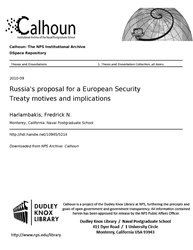File:Russia's proposal for a European Security Treaty motives and implications (IA russiasproposalf109455214).pdf

Original file (1,275 × 1,650 pixels, file size: 538 KB, MIME type: application/pdf, 98 pages)
Captions
Captions
Summary[edit]
| Russia's proposal for a European Security Treaty motives and implications
( |
||
|---|---|---|
| Author |
Harlambakis, Fredrick N. |
|
| Title |
Russia's proposal for a European Security Treaty motives and implications |
|
| Publisher |
Monterey, California. Naval Postgraduate School |
|
| Description |
Russian President Dmitry Medvedev's proposal for a European Security Treaty (EST) is an ambitious attempt to reshape the current Euro-Atlantic order, and thereby, advance Moscow's security interests. The EST proposed by Moscow would be a legally binding agreement. According to Moscow, it would uphold the principles of international law and achieve equal security for all states in the Euro-Atlantic region. However, the North Atlantic Treaty Organization (NATO) allies generally view this treaty proposal as an attempt to undermine existing Euro-Atlantic security institutions, such as NATO and the Organization for Security and Cooperation in Europe (OSCE). The EST proposal reflects Russian discontent with the current Euro-Atlantic security order. Many Russians hold that NATO has disregarded Russia's security interests since the collapse of the Soviet Union, notably in the Alliance enlargement process. Although the EST proposal has been dismissed by some observers as a Russian ploy to fracture NATO, governments in the Euro-Atlantic region have acknowledged the need to ensure that Russia's legitimate security interests are respected. NATO and Russia may find it to their advantage to pursue long-term cooperation on the basis of shared interests. They may then together deal effectively with the emerging threats of the twenty-first century. Subjects: International law |
|
| Language | English | |
| Publication date | September 2010 | |
| Current location |
IA Collections: navalpostgraduateschoollibrary; fedlink |
|
| Accession number |
russiasproposalf109455214 |
|
| Source | ||
| Permission (Reusing this file) |
This publication is a work of the U.S. Government as defined in Title 17, United States Code, Section 101. As such, it is in the public domain, and under the provisions of Title 17, United States Code, Section 105, may not be copyrighted. | |
Licensing[edit]
| Public domainPublic domainfalsefalse |
This work is in the public domain in the United States because it is a work prepared by an officer or employee of the United States Government as part of that person’s official duties under the terms of Title 17, Chapter 1, Section 105 of the US Code.
Note: This only applies to original works of the Federal Government and not to the work of any individual U.S. state, territory, commonwealth, county, municipality, or any other subdivision. This template also does not apply to postage stamp designs published by the United States Postal Service since 1978. (See § 313.6(C)(1) of Compendium of U.S. Copyright Office Practices). It also does not apply to certain US coins; see The US Mint Terms of Use.
|
 | |
| This file has been identified as being free of known restrictions under copyright law, including all related and neighboring rights. | ||
https://creativecommons.org/publicdomain/mark/1.0/PDMCreative Commons Public Domain Mark 1.0falsefalse
File history
Click on a date/time to view the file as it appeared at that time.
| Date/Time | Thumbnail | Dimensions | User | Comment | |
|---|---|---|---|---|---|
| current | 11:51, 24 July 2020 |  | 1,275 × 1,650, 98 pages (538 KB) | Fæ (talk | contribs) | FEDLINK - United States Federal Collection russiasproposalf109455214 (User talk:Fæ/IA books#Fork8) (batch 1993-2020 #26981) |
You cannot overwrite this file.
File usage on Commons
The following page uses this file:
Metadata
This file contains additional information such as Exif metadata which may have been added by the digital camera, scanner, or software program used to create or digitize it. If the file has been modified from its original state, some details such as the timestamp may not fully reflect those of the original file. The timestamp is only as accurate as the clock in the camera, and it may be completely wrong.
| Short title | Russia's proposal for a European Security Treaty motives and implications |
|---|---|
| Image title | |
| Author | Harlambakis, Fredrick N. |
| Software used | Harlambakis, Fredrick N. |
| Conversion program | Acrobat Distiller 9.3.3 (Windows) |
| Encrypted | no |
| Page size | 612 x 792 pts (letter) |
| Version of PDF format | 1.4 |

